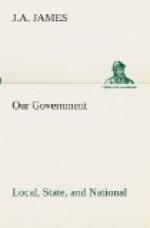Just as it would be impossible for all the voters to take part in applying or interpreting the law, so it is in most cases impossible for them to assemble in a body and make the laws. They generally delegate this work to legislators; but in some States the voters of a town (or township) assemble yearly in town meeting, where all may take part in discussion and in voting.
Roads and Streets.—The preservation of order is but one of the functions of government. In towns where the population is scattered, roads must be built, and it is still more necessary that in villages and cities, where many people live within a small area, streets should be graded and paved and sidewalks maintained. This is an illustration of the way in which, through the machinery of government, people provide themselves with many conveniences that it would be impossible for each citizen to provide for himself. The legislative bodies already mentioned determine the extent to which these things shall be done: the town board orders the laying out of a new road; the village board or the city council passes ordinances saying what streets shall be paved and what materials shall be used in the work.
Executive Officers, General and Special.—The actual execution of the work involved in public improvements is generally in charge of a special officer, such as the road or street commissioner. But since there are many other matters of public concern that require attention, each under the control of an executive officer, it is necessary that a general officer should be in authority over all of these as the chief executive of the local government. This officer is known by various titles, as, in the town, the chairman, in the village, the president, and in the city, the mayor. In any case, he has all or most of the important executive work of government under his control. It is his duty to see that the laws are obeyed, so the police officers are subject to his orders. The chief executive is guardian of the people’s interests; for he must see that the minor officers do not injure the public welfare by neglect of duty, and he must defend the public from all persons who would encroach upon its rights.
Let us now consider some of the other ordinary functions of local government.
The Poor.—Poor relief may be mentioned first. How much aid shall be granted to paupers, and how shall it be distributed, are questions that everywhere require attention.
Public Health.—Public health is also an important subject upon which local laws must been enacted. In cities, particularly, the council passes strict regulations for preventing diseases and for checking the spread of such as are contagious. City ordinances are also enacted regulating the construction of sewers and drains. The health commissioner and the city physicians are the particular officers who direct the execution of laws upon these subjects.




